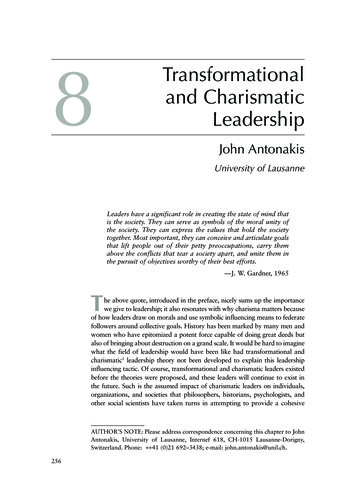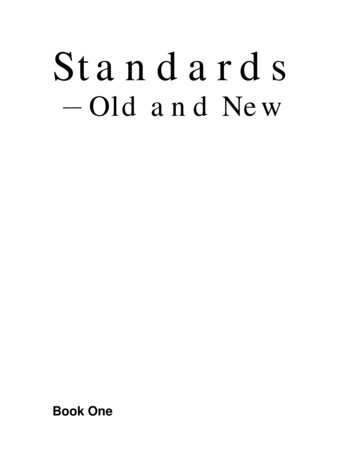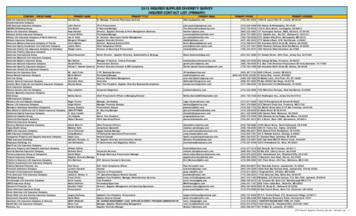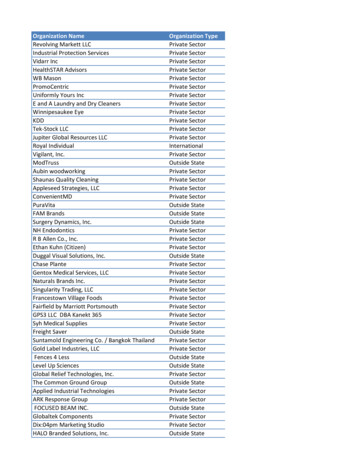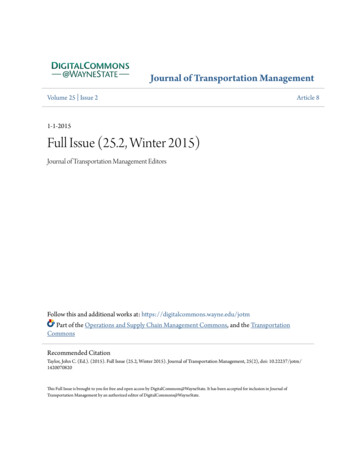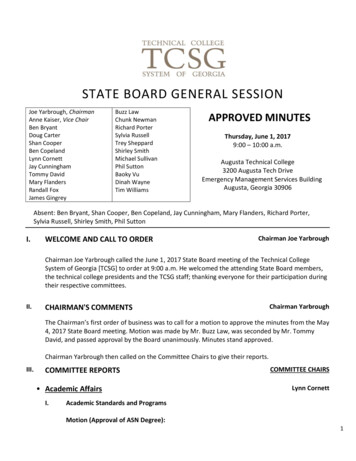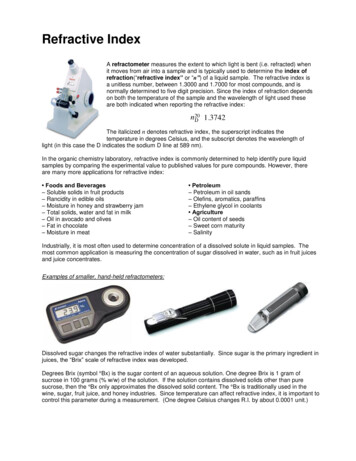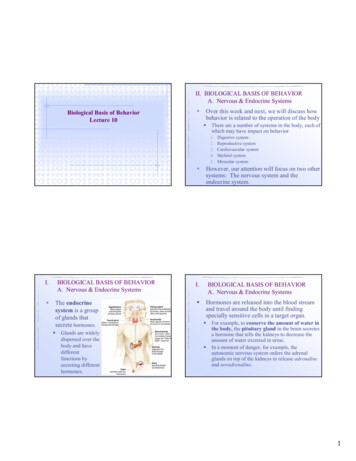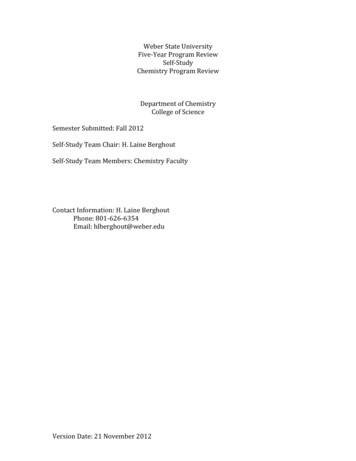
Transcription
Weber State UniversityFive-Year Program ReviewSelf-StudyChemistry Program ReviewDepartment of ChemistryCollege of ScienceSemester Submitted: Fall 2012Self-Study Team Chair: H. Laine BerghoutSelf-Study Team Members: Chemistry FacultyContact Information: H. Laine BerghoutPhone: 801-626-6354Email: hlberghout@weber.eduVersion Date: 21 November 2012
A. Brief Introductory StatementThe Department of Chemistry is housed within the College of Science. It isapproved and certified by the American Chemical Society (ACS). Two options areoffered that lead to the Bachelor of Science degree in Chemistry. Option 1specifically meets all the requirements of the ACS and the graduates' names aresubmitted to the ACS and certified by the department. Option 2 provides a solidfoundation in chemistry that is suitable for Pre-Medical, Pre-Dental, Pre-Pharmacy,and other Pre-Medical Professional students. The Chemistry Teaching Major leadsto a Bachelor of Science Degree with secondary education licensure. The Chemistryminor, Chemistry Teaching Minor, and a Bachelor of Integrated Studies, BIS,emphasis in Chemistry are also available. The two-year Chemical TechnicianProgram, leading to an Associate of Applied Science Degree or a Certificate of SkillProficiency, is designed to emphasize skills required for employment as a technicianin chemical laboratories. The chemistry faculty’s range of expertise includesAnalytical Chemistry, Biochemistry, Inorganic Chemistry, Organic Chemistry, andPhysical Chemistry.B. Program Mission and VisionThe mission of the Chemistry Department is to provide chemistry majors with theskills and knowledge of chemistry they need to successfully pursue their chosenprofessional careers and other activities following graduation from Weber StateUniversity. Included with this goal is the more global application to provide a solidtheoretical and experimental chemistry foundation for other majors across campus,including but not limited to: Physics, Microbiology, Botany, Zoology, Geosciences,Criminalistics, Allied Health, Pre-Engineering, Pre-Profession students, and a generalliberal education in chemistry for non-science majors (general education). TheDepartment also provides services that require chemical expertise at the University andin our community. Faculty members are involved in community science and researchprojects which promote science education at all levels. Along with the faculty members,chemistry students render significant service each year at events such as the Utah StateScience and Engineering Fair and Science Olympiad. The five main chemical expertiseareas are: physical, analytical, organic, inorganic and biochemistry. The Departmentseeks to foster and promote learning and proficiency in each of these areas.Our vision for the Weber State University Chemistry department is to berecognized as Utah’s leader in undergraduate chemistry education by providing a highlyversatile four-year American Chemistry Society certified program with outstandingfaculty and specific strengths in analytical and medicinal chemistry, offering a strongtwo-year chemical technician degree, and fostering meaningful relationships withindustry and government agencies.C. Program Overview1. Chemistry Major (BS)Version Date: 21 November 2012
2.3.4.5.6.7.a. Option 1, ACS Certified – 75 credit hours required within major (57credit hours of chemistry coursework and 18 credits hours of supportcoursework provided by other departments)b. Option 2 – 71 credit hours required within major (53 credit hours ofchemistry coursework and 18 credit hours support courseworkprovided by other departments)Chemistry Teaching Major (BS) – 43 credit hours required within major (40credit hours of chemistry coursework and 3 credit hours of courseworkprovided by other departments)Chemistry Minor – 20 credit hours required within minorChemistry Teaching Minor – 26 credits required within minorChemistry BIS Emphasis – 18 credit hours required within emphasisChemical Technician (AAS) – 35 credit hours required within programChemical Technician (Institutional Certificate) – 41 credit hours requiredComplete program descriptions and requirements are listed in the WSUCatalog along with course descriptions. The following summarizes currentchemistry major requirements.1a. Major Course Requirements for BS DegreeCore RequirementsCHEM 1210 PS - Principles of Chemistry I (5)CHEM 1220 - Principles of Chemistry II (5)CHEM 2310 - Organic Chemistry I (4)CHEM 2315 - Organic Chemistry I Lab (1)CHEM 2320 - Organic Chemistry II (4)CHEM 2325 - Organic Chemistry II Lab (1)CHEM 3000 - Quantitative Analysis (4)CHEM 3020 - Computer Applications in Chemistry (1)Option 1 (ACS Certified) Required Courses Beyond the CoreCHEM 3050 - Instrumental Analysis (4)CHEM 3070 - Biochemistry I (4)CHEM 3400 - Molecular Symmetry and Applied Math for PhysicalChemistry (3)CHEM 3410 - Physical Chemistry I (4) andCHEM 3420 - Physical Chemistry II (4)CHEM 4540 - Spectrometric and Separation Methods (4)CHEM 4600 - Inorganic Chemistry (4) *CHEM 4700 - Special Topics in Chemistry (1-3) (2 credit hours required)CHEM 4800 - Research and Independent Study in Chemistry (1-3) (2 credithours required) *CHEM 4990 - Senior Seminar (1)Required Support CoursesMATH 1210 - Calculus I (4) andVersion Date: 21 November 2012
MATH 1220 - Calculus II (4)PHYS 2210 PS - Physics for Scientists and Engineers I (5) andPHYS 2220 - Physics for Scientists and Engineers II (5)1b. Option 2 Required Courses Beyond the CoreCHEM 3050 - Instrumental Analysis (4)CHEM 3400 - Molecular Symmetry and Applied Math for PhysicalChemistry (3)CHEM 3410 - Physical Chemistry I (4)CHEM 3420 - Physical Chemistry II (4)CHEM 4700 - Special Topics in Chemistry (1-3) (2 credit hours required) *CHEM 4800 - Research and Independent Study in Chemistry (1-3) (2 credithours required) *CHEM 4990 - Senior Seminar (1)Chemistry Electives (8 credit hours required from the following)CHEM 3070 - Biochemistry I (4)CHEM 3080 - Biochemistry II (3)CHEM 3090 - Biochemical Techniques (1)CHEM 4540 - Spectrometric and Separation Methods (4)CHEM 4600 - Inorganic Chemistry (4)Required Support Courses (18 credit hours)MATH 1210 - Calculus I (4) andMATH 1220 - Calculus II (4)PHYS 2210 PS - Physics for Scientists and Engineers I (5) andPHYS 2220 - Physics for Scientists and Engineers II (5)Major Course Requirements for BS DegreeChemistry Core Courses Required (25 credit hours)CHEM 1210 PS - Principles of Chemistry I (5) andCHEM 1220 - Principles of Chemistry II (5)CHEM 2310 - Organic Chemistry I (4) andCHEM 2315 - Organic Chemistry I Lab (1)CHEM 2320 - Organic Chemistry II (4) andCHEM 2325 - Organic Chemistry II Lab (1)CHEM 3000 - Quantitative Analysis (4)CHEM 3020 - Computer Applications in Chemistry (1)2. Teaching Major Required Courses Beyond the CoreCHEM 2600 - Laboratory Safety (1)CHEM 3570 - Foundations of Science Education (3)CHEM 4570 - Secondary School Science Teaching Methods (3)CHEM 4800 - Research and Independent Study in Chemistry (1-3) (1 credithour required)Version Date: 21 November 2012
Electives (7 credit hours required from the following)CHEM 3050 - Instrumental Analysis (4)CHEM 3070 - Biochemistry I (4)CHEM 3080 - Biochemistry II (3)CHEM 3410 - Physical Chemistry I (4)CHEM 3420 - Physical Chemistry II (4)Required Support CourseHIST 3350 - History and Philosophy of Science (3)3. Course Requirements for MinorCHEM 1210 PS - Principles of Chemistry I (5)CHEM 1220 - Principles of Chemistry II (5)Chemistry Electives (10 credit hours of chemistry coursework numbered2000 and above)4. Course Requirements for Teaching MinorCHEM 1210 PS - Principles of Chemistry I (5)CHEM 1220 - Principles of Chemistry II (5)CHEM 2310 - Organic Chemistry I (4) andCHEM 2315 - Organic Chemistry I Lab (1)CHEM 2320 - Organic Chemistry II (4) andCHEM 2325 - Organic Chemistry II Lab (1)Elective (3 credit hours of approved chemistry elective, 3000 or above)Required Support CourseHIST 3350 - History and Philosophy of Science (3)For students not obtaining Teaching Majors in Sciences, the followingcourses are also required:CHEM 2600 - Laboratory Safety (1)CHEM 3570 - Foundations of Science Education (3)CHEM 4570 - Secondary School Science Teaching Methods (3)5. Course Requirements for BIS EmphasisCHEM 1210 PS - Principles of Chemistry I (5)CHEM 1220 - Principles of Chemistry II (5)Chemistry Electives (Select additional chemistry coursework including atleast 8 credit hours of upper division courses numbered 3000 andabove.)6. Major Course Requirements for AAS DegreeCHEM 1210 PS - Principles of Chemistry I (5)Version Date: 21 November 2012
CHEM 1220 - Principles of Chemistry II (5)CHEM 2600 - Laboratory Safety (1)CHEM 2990 - Chemical Technician Seminar (1)CHEM 3000 - Quantitative Analysis (4)CHEM 3020 - Computer Applications in Chemistry (1)CHEM 3050 - Instrumental Analysis (4)Required Support Courseminimum MATH 1010 - Intermediate Algebra (4) or equivalentElective Courses (10 credit hours from the following with at least 4 credithours must be 2000-level or higher)CHEM 2310 - Organic Chemistry I (4) andCHEM 2315 - Organic Chemistry I Lab (1)CHEM 2320 - Organic Chemistry II (4) andCHEM 2325 - Organic Chemistry II Lab (1)CHEM 2890 - Cooperative Work Experience (1-6)CHEM 3070 - Biochemistry I (4)CHEM 3080 - Biochemistry II (3)CHEM 3090 - Biochemical Techniques (1)CHEM 4540 - Spectrometric and Separation Methods (4)CHEM 4890 - Cooperative Work Experience (1-6)MICR 2054 LS - Principles of Microbiology (4)MICR 3053 - Microbiological Procedures (3)MICR 3254 - Immunology (4)MICR 4154 - Microbial Genetics (4)MICR 4252 - Cell Culture (2)BTNY 1403 LS - Environment Appreciation (3-4)BTNY 2104 - Plant Form and Function (4)BTNY 3153 - Biology of the Plant Cell (3)GEO 1110 PS - Dynamic Earth: Physical Geology (3)GEO 1115 - Physical Geology Lab (1)GEO 2050 - Earth Materials (4)PHYS 1010 PS - Elementary Physics (3)PHYS 2010 PS - College Physics I (5) orPHYS 2210 PS - Physics for Scientists and Engineers I (5)PHYS 2020 - College Physics II (5) orPHYS 2220 - Physics for Scientists and Engineers II (5)ZOOL 2200 - Human Physiology (4)ZOOL 3200 - Cell Biology (4)ZOOL 3300 - Genetics (4)ZOOL 4300 - Molecular Genetics (4)CJ 1350 - Introduction to Forensic Science (3)CJ 4110 - Physical Methods in Forensic Science (4)CJ 4115 - Friction Ridge Analysis (4)CJ 4120 - Advanced Methods in Forensic Science (4)Version Date: 21 November 2012
7. Course Requirements for Institutional CertificateCHEM 1210 PS - Principles of Chemistry I (5) andCHEM 1220 - Principles of Chemistry II (5)CHEM 2600 - Laboratory Safety (1)CHEM 2990 - Chemical Technician Seminar (1)CHEM 3000 - Quantitative Analysis (4)CHEM 3020 - Computer Applications in Chemistry (1)CHEM 3050 - Instrumental Analysis (4)Required Support CoursesENGL 1010 EN - Introductory College Writing (3)One additional course in oral or written communications (3)Minimum MATH 1010 - Intermediate Algebra (4) or equivalentElective Courses (10 credit hours from the following with at least 4 credithours must be 2000-level or higher)CHEM 2310 - Organic Chemistry I (4) andCHEM 2315 - Organic Chemistry I Lab (1)CHEM 2320 - Organic Chemistry II (4) andCHEM 2325 - Organic Chemistry II Lab (1)CHEM 2890 - Cooperative Work Experience (1-6)CHEM 3070 - Biochemistry I (4)CHEM 3080 - Biochemistry II (3)CHEM 3090 - Biochemical Techniques (1)CHEM 4540 - Spectrometric and Separation Methods (4)CHEM 4890 - Cooperative Work Experience (1-6)MICR 2054 LS - Principles of Microbiology (4)MICR 3053 - Microbiological Procedures (3)MICR 3254 - Immunology (4)MICR 4154 - Microbial Genetics (4)MICR 4252 - Cell Culture (2)BTNY 1403 LS - Environment Appreciation (3-4)BTNY 2104 - Plant Form and Function (4)BTNY 3153 - Biology of the Plant Cell (3)GEO 1110 PS - Dynamic Earth: Physical Geology (3)GEO 1115 - Physical Geology Lab (1)GEO 2050 - Earth Materials (4)PHYS 1010 PS - Elementary Physics (3)PHYS 2010 PS - College Physics I (5) orPHYS 2210 PS - Physics for Scientists and Engineers I (5)PHYS 2020 - College Physics II (5) orPHYS 2220 - Physics for Scientists and Engineers II (5)ZOOL 2200 - Human Physiology (4)ZOOL 3200 - Cell Biology (4)ZOOL 3300 - Genetics (4)Version Date: 21 November 2012
ZOOL 4300 - Molecular Genetics (4)CJ 1350 - Introduction to Forensic Science (3)CJ 4110 - Physical Methods in Forensic Science (4)CJ 4115 - Friction Ridge Analysis (4)CJ 4120 - Advanced Methods in Forensic Science (4)The program and curriculum changes that have taken place during the pastfive years are described in the next section.Chemistry is a versatile program. The Option 1 Chemistry Major is certified bythe American Chemical Society’s Committee on Professional Training, ACS-CPT.All chemistry majors are required to gain a basic knowledge of chemistry principlesand instrumentation with an emphasis on problem solving, critical thinking, andanalytical skills. By the time a chemistry major is ready for graduation, he or she willhave experience and, in some cases, expertise with many of the instruments we havein the department. The learning experience presented to our majors is unique becausechemistry is one of the few academic disciplines included in a traditional liberaleducation that provides technical skills and training suitable for direct employmentafter graduation.As part of the training process, the Chemistry Department in conjunction with theCenter for Chemical Technology has provided cooperative work experiences formany of our majors. Indeed, some chemistry students have the opportunity to workwith industrial and governmental laboratories before they graduate. On occasion,faculty members consult with these companies and continue to maintain activepartnerships. These partnerships stimulate faculty vitality and scholarly researchactivity. Moreover, they provide an outside source of funding to help maintainequipment here at WSU. When faculty actively pursue research interests, studentsbecome involved and the process benefits both the student and the community. Someof our students have been promoted beyond the internship and are presently employedwith the same company. These companies frequently ask us to provide them withadditional students as interns and full-time employees.The Chemistry Department demonstrates impressive scholarship and collegiality.Of the eleven full-time (tenured or tenure track) faculty members, nine are authorsand/or coauthors of commercially published chemistry textbooks and laboratory CD’s.Four are authors of widely used materials. If in-house laboratory manuals areincluded, ten out of eleven of the faculty has authored essential material for chemicaleducation. Nine faculty members have mentored undergraduate research students inthe past five years, and some have made presentations outside the university andpublished papers in peer-reviewed journals. Thus, a majority of the faculty areactively engaged in development and delivery of course material and/or research.Nationally, higher education is becoming increasingly dependent on adjunct andpart time faculty. Our students have the benefit of being taught by the facultymembers who are internationally recognized authors of the books used by thestudents in the course. Moreover, full-time faculty members who have eitherVersion Date: 21 November 2012
authored the laboratory manuals and/or teach the lecture series teach many of thelaboratory sections offered at WSU. We do not offer any laboratory courses taughtby instructor specialists. We currently cover some laboratory sections with a teachingassistant (TA). However, the TA is usually an upper classman who works directlywith a faculty member who is simultaneously teaching another section of the samelaboratory course in a neighboring lab room. All laboratory students have access tothe faculty member for any questions or concerns they may have during thelaboratory exercise. Our laboratory classes are an integral part of the courses here,which allows for better correlation of laboratory exercises with lecture material.Much of what we do in the Chemistry Department is considered service to otherdisciplines across campus. In general, the Chemistry Department has averaged 10.4B.S. graduates per year for the last five years (see Appendix A) but our servicecourses are filled with 60-120 students per section with over 17,354 student credithours, SCHs, taught last year (see Appendix A). The Chemistry Department providesa knowledge base for many other disciplines on campus ranging from pre-engineeringto nursing. We offer upper-division service courses in biochemistry for life sciencemajors and pre-professional students.The service provided by the Chemistry Department is often directed towards thecommunity and rendered beyond the boundaries of WSU. Many faculty members areactively involved in community science projects that promote science education at alllevels. Numerous teachers from local school districts, some of which are formerstudents, regularly request prepared materials for scientific experiments. Othersrequest information on safe handling procedures and disposal of materials.Occasionally, faculty members travel to local elementary schools and give chemistrydemonstrations. Over the years, faculty members of the chemistry department alongwith other members of the College of Science have organized and directed the UtahState Science and Engineering Fair for junior and senior high school students. TheChemistry Department is actively engaged in community affairs because the facultymembers generally strive to be involved with education at all levels.Part of the community awareness and the cohesiveness of the chemistrydepartment can be attributed to the connection that our faculty members have with thecommunity. The six adjunct professors currently teaching chemistry at WSU areseasoned professionals. The adjunct faculty complements the strengths of thedepartment and has proven to be valuable assets. We have only had three facultymembers leave the institution for reasons other than retirement in the past 20 years.Low employee turnover can be interpreted to indicate satisfaction with work and theworkplace environment. The Chemistry Department remains a positive influence inthe university and general public served by the university.The Chemistry Department offers an extensive summer program every year. Thenumber of students in the summer program remains strong. Our departmentcontinues to offer accelerated chemistry courses during the summer that servestudents throughout the state and neighboring states. The structure of the summersemester allows students the opportunity to complete a full academic year of courseVersion Date: 21 November 2012
material in principles of chemistry or organic chemistry in one semester. Theprinciples and organic courses are taught in two seven-week blocks, each coveringthe same material that is covered in a normal semester. Students attend lecture for 2.5hours a day, four days a week. They complete two three-hour laboratory assignmentseach week. Accelerated courses are not recommended for all students due to paceand intensity, but they continue to provide a valuable opportunity for many studentswho are seeking to move ahead in their schooling during the summer semester.Online courses provide an important service to out-of-area students and localstudents who have difficult schedules. Chemistry’s online CHEM 1050, CHEM 1110,and CHEM 1120 courses serve students in health professions and technology thatrequire a full year of chemistry. We offer multiple online sections of CHEM 1010,which specifically satisfies the university General Education requirement. All ofthese courses are in high demand by both local students as well as out-of-areastudents. Our online CHEM 1050, CHEM 1110, and CHEM 1120 courses arerecognized and recommended by health professions programs across the nation andaround the world.D. Curriculum Overview and Student Learning Outcomes and AssessmentCourse DescriptionsThe following courses are regularly offered by the Chemistry Department atWeber State UniversityCHEM PS1010. Introductory Chemistry (3)A lecture-demonstration course for students with no previous chemistrybackground who are not majoring in areas requiring further chemistry. Threehours of lecture-demonstration a week.CHEM PS1050. Introduction to General, Organic & Biochemistry (5)An introduction to general, organic and biochemistry designed primarily forstudents of nursing and other majors that require no more than one semester ofchemistry. Four hours of lecture and one 3-hour lab a week. The associated lab,CHEM 1055, is offered for transfer students that have already completed anequivalent lecture course elsewhere.CHEM PS1110. Elementary Chemistry (5)Fundamentals of inorganic chemistry and introduction to organic chemistry. Thefirst course in a two-semester sequence designed primarily for students ofnursing, engineering technology and some other fields of science and healthprofessions who will take no more than one year of chemistry. Four hours oflecture and one 3-hour lab a week. The associated lab, CHEM 1115, is offered fortransfer students that have already completed an equivalent lecture courseelsewhere.Version Date: 21 November 2012
CHEM 1120. Elementary Organic Bio-Chemistry (5)Elementary study of the compounds of carbon and chemical compounds andreactions of biological systems. Four hours of lecture and one 3-hour lab a week.Prerequisite: CHEM PS1110 or equivalent. The associated lab, CHEM 1125, isoffered for transfer students that have already completed an equivalent lecturecourse elsewhere.CHEM 1200. Preparation for College Chemistry (3)A course designed to provide the minimal prerequisite skills needed for entryinto CHEM PS1210. Three hours of lecture per week.CHEM PS1210. Principles of Chemistry I (5)The first course in a series designed primarily for science majors and others whowill take more than one year of chemistry such as pre-medical students,clinical/medical laboratory scientists and some engineering students. Thefundamental principles of chemistry are covered, including measurement,matter, stoichiometry, chemical reactions, thermochemistry, atomic structure,chemical periodicity, chemical bonding, intermolecular forces, gases, liquids,solids, and solutions. Laboratory emphasis is on qualitative and quantitativemethods of analysis. Four hours of lecture and one 3-hour lab a week.Prerequisite: MATH 1010 or equivalent and a chemistry course equivalent tohigh school chemistry or CHEM 1200. The associated lab, CHEM 1215, is offeredfor transfer students that have already completed an equivalent lecture courseelsewhere.CHEM 1220. Principles of Chemistry II (5)Second semester of principles of chemistry. Topics include chemical kinetics,equilibrium, thermodynamics, electrochemistry, properties of the elements,nuclear chemistry, and an introduction to organic chemistry. Four hours oflecture and one 3-hour lab a week. Prerequisite: CHEM 1210. The associated lab,CHEM 1225, is offered for transfer students that have already completed anequivalent lecture course elsewhere.CHEM PS1360. Principles of Physical Science (3)A lecture/laboratory course designed to provide an introduction to the scientificmethod and its application to the study of selected topics in physics andchemistry. Two hours of lecture and one 3-hour lab per week. Recommended forElementary Education majors.CHEM 2310. Organic Chemistry I (4)Principles of organic chemistry, including structure and reactivity of carbonbased molecules. Detailed study of mechanisms, synthesis, and reactions. Alkane,alkyl halide, alkyne, alcohol, and ether families are covered. Four hours of lecturea week. Prerequisite: CHEM 1220. Corequisite: CHEM 2315.CHEM 2315. Organic Chemistry I Lab (1)Version Date: 21 November 2012
Lab course designed to be taken with CHEM 2310. Includes organic laboratorytechniques, synthesis, product isolation, spectroscopy and analysis. Prerequisite:CHEM 1220. Co-requisite: must have completed or currently be enrolled inCHEM 2310 lecture.CHEM 2320. Organic Chemistry II (4)Principles of organic chemistry, second semester. A continuation of structureand reactivity analysis, along with structure elucidation techniques,spectroscopy and synthetic reactions. Coverage includes aromatics, carbonyls,carboxylic acid derivatives, and sugars. Four hours of lecture a week.Prerequisites: CHEM 2310 and 2315.CHEM 2325. Organic Chemistry II Lab (1)Lab course designed to be taken with CHEM 2320. Includes organic laboratorytechniques, synthesis, product isolation, spectroscopy and analysis.Prerequisites: CHEM 2310 and 2315. Co-requisite: must have completed orcurrently be enrolled in CHEM 2320 lecture.CHEM 2600. Laboratory Safety (1)An interdisciplinary, team-taught course that will be an overview of the majorchemical, biological and physical safety issues related to science laboratories andfield work. Class will meet once per week and will be taught in alecture/demonstration format.CHEM 2890. Cooperative Work Experience (1-6)Open to all students in the Chemistry Department who meet the minimumCooperative Work Experience requirements of the department. Providesacademic credit for on-the-job experience. Grade and amount of credit will bedetermined by the department.CHEM 2990. Chemical Technician Seminar (1)A course designed to provide the skills necessary to enter the job market as aChemical Technician. Prerequisite: CHEM 1220. One hour of lecture/discussion aweek.CHEM 3000. Quantitative Analysis (4)Theory and methods of gravimetric and volumetric analysis and simpleinstrumentation. Includes statistical evaluation of results. Three hours of lectureand one 3-hour lab per week. Prerequisite: CHEM 1220. Prerequisite or corequisite: CHEM 3020. The associated lab, CHEM 3005, is offered for transferstudents that have already completed an equivalent lecture course elsewhere.CHEM 3020. Computer Applications in Chemistry (1)A course designed to provide students computer skills for applications includingcomputation and electronic data bases searches. It is required that this course beVersion Date: 21 November 2012
taken before or with CHEM 3000. One hour of lecture/discussion a week.Prerequisite: CHEM 1210.CHEM 3050. Instrumental Analysis (4)Theory and methods of modern instrumental analysis. Includes practicalapplications in electrochemical, spectrometric, and chromatographic techniques.Three hours of lecture and one three hour laboratory per week. Prerequisite:CHEM 3000.CHEM 3070. Biochemistry I (4)Structure and function of biomolecules including proteins, nucleic acids, fats andcarbohydrates. A focus on proteins as energy transforming and catalytic devices;their role in metabolism, defense and other biochemical processes. Threelectures and one three hour lab a week. Prerequisite: CHEM 2310. Theassociated lab, CHEM 3075, is offered for transfer students that have alreadycompleted an equivalent lecture course elsewhere.CHEM 3080. Biochemistry II (3)A detailed study of the molecular basis of life: nucleic acids, biosyntheticpathways, molecular aspects of disease and pharmacology. Three lectures aweek. Prerequisite: CHEM 2320 , CHEM 3070.CHEM 3090. Biochemical Techniques (1)Advanced techniques including instrumentation for biochemistry. One 3-hourlab per week. Prerequisites CHEM 2320 and Chem3070. To be takenconcurrently with CHEM 3080.CHEM 3400. Molecular Symmetry and Applied Math for Physical Chemistry (3)An introduction to molecular symmetry, experimental error analysis, andphysical chemistry applications of algebra, linear algebra, and differentialequations. Prerequisite: MATH 1220. Co-requisite: CHEM 3410.CHEM 3410. Physical Chemistry I (4)The first semester course of Physical Chemistry covering chemicalthermodynamics and kinetics. Three hours of lecture and one 3-hour lab a week.Prerequisites: CHEM 3000 and PHYS 2220. Co-requisite: CHEM 3400.CHEM 3420. Physical Chemistry II (4)The second semester course of Physical Chemistry covering quantum mechanics,statistical mechanics, and chemical reaction dynamics. Three hours of lectureand one 3-hour lab a week. Prerequisite: CHEM 3410CHEM 3570. Foundations of Science Education (3)A thorough investigation of research in science learning and curricularstandards at the state and national levels. Foundations of the philosophy ofscience and scientific inquiry as applicable to science teaching at the secondaryVersion Date: 21 November 2012
level. This course serves as a foundation to a preservice science teacher’seducation coursework.CHEM 4540. Spectrometric and Separation Methods (4)Theory and practice of spectrometric and separation methods in the study ofchemical systems. Three hours of lecture and one 3-hour lab per week.Prerequisite: CHEM 3420 or permission of instructor.CHEM 4550. Geochemistry (3)The chemistry of the earth and geochemical processes operating in thelithosphere, hydrosphere, and atmosphere with a synthesis of these ideas toaccount for the chemical evolution of the earth. Applications to mineral stabilityand chemical reactions, geochemical cycles, and isotope geochemistry. Threehours of lecture a week. Prerequisites: CHEM 1220 and GEO 2050 or consent ofinstructor.CHEM 4570. Secondary School Science Teaching Methods (3)Acquaintance and practice with various teaching and assessment methods.Development of science curricula including lesson and unit plans. It isrecommended that this course be completed immediately before studentteaching. Prerequisite: Admission to the Teacher Education Program.CHEM 4600. Inorganic Chemistry (4)A study of the elements and their compounds based on the periodic table,current theories and laboratory work. Prerequisites: CHEM 3420 or permissionof instructor. Three hours of lecture and one 3-hour lab a week.CHEM 4700. Special Topics in Chemistry (1-3) variable titleThis course may be repeated for credit. Prerequisite: CHEM 3420 or permissionof instruc
Self-Study Chemistry Program Review Department of Chemistry College of Science Semester Submitted: Fall 2012 Self-Study Team Chair: H. Laine Berghout Self-Study Team Members: Chemistry Faculty Contact Information: H. Laine Berghout Phone:

